
Welcome to Caribbean Shipping Lanes (CSL), the SRC’s dedicated page on shipping, climate change, and trade. Here, you will find vital resources aimed at supporting Caribbean nations in navigating global shipping regulations and advancing climate resilience.
This Project, established in mid-2024, is housed at the Shridath Ramphal Centre for International Trade Law, Policy and Services of The University of the West Indies Cave Hill, and has been instrumental in strengthening the CARICOM’s participation in International Maritime Organization (IMO) negotiations. With funding and critical support from the United Nations Foundation, and with ongoing technical and convening assistance from the University College London and the Belize Port Authority, the CSL Project works closely with national delegations, and regional maritime entities to coordinate and assist in managing the Caribbean’s technical participation in the negotiations falling under the IMO’s 2023 Strategy on Reduction of GHG Emissions from Ships.
CSL also coordinates and commissions expert work including impact assessments, economic modeling, legal analysis, and stakeholder consultations to better understand how the IMO’s decarbonization measures will affect the Caribbean. This project adds to the work of regional entities, including the Maritime Technology Cooperation Centre Caribbean (MTCC-Caribbean), the Caribbean’s leading research institution on shipping issues, advancing sustainable practices and GHG reduction efforts.
About the Project
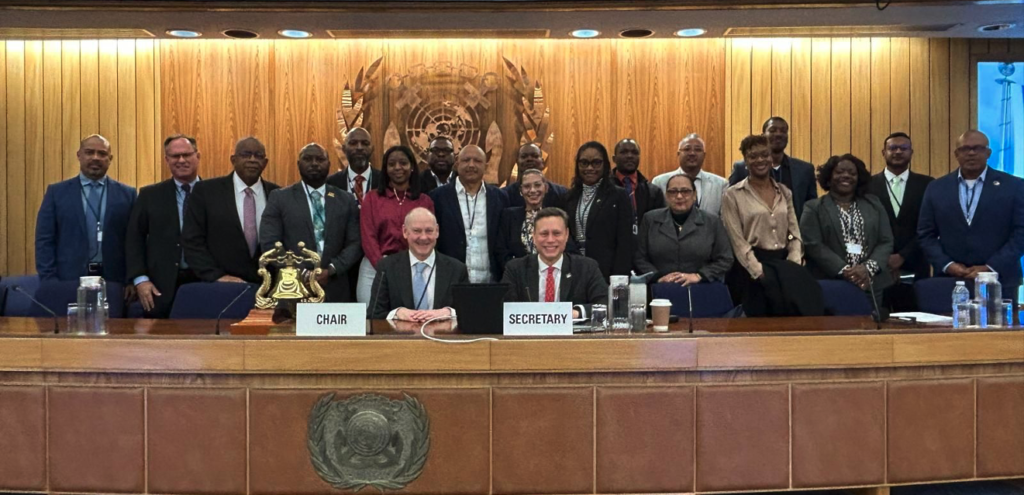
The international shipping industry, under the guidance of the IMO, has set an ambitious target to achieve net-zero emissions by or around 2050. Central to this commitment is the 2023 IMO Strategy on Reduction of GHG Emissions from Ships, which establishes a dual approach: a goal-based greenhouse gas (GHG) fuel intensity standard and a pricing mechanism for maritime GHG emissions.
To implement this strategy, binding measures—collectively referred to as the “basket of measures”—are being negotiated to support the transition of the shipping industry. The Strategy outlines emission reduction targets for 2030 and 2040, with a review of net-zero emissions by or around 2050. Key priorities for this transition are to enable a level playing field and to ensure a just and equitable transition that leaves no country behind. The overall transition is expected to cost over USD 1 trillion by 2050.
The CSL Project focuses on addressing the unique challenges faced by the region, ensuring that the outcomes of IMO negotiations reflect and protect the Caribbean’s maritime interests and promote sustainable development in the face of climate change. For Caribbean states, whose economies depend heavily on maritime trade, these negotiations hold significant importance, as they impact regional trade, economic stability, and climate resilience. The CSL Project seeks to:
- Enhance the capacity of regional negotiators and policymakers to advocate for just and equitable measures that align with the region’s economic and developmental priorities.
- Conduct technical analyses and stakeholder consultations to evaluate how the IMO’s basket of measures will affect Caribbean economies, trade, and maritime sectors.
- Advocate for financing mechanisms, technical assistance, and capacity-building initiatives that ensure a just transition for SIDS.
- Strengthen collaboration among Caribbean nations to develop unified positions on key maritime policies and advance shared regional interests at the IMO.
Key Activities
- Research and Analysis – Providing data-driven insights on the economic and environmental implications of proposed maritime decarbonization measures for the region.
- Stakeholder Consultations – Hosting national and regional discussions with maritime administrations, shipping operators, port authorities, and other key actors to gather insights on policy impacts.
- Capacity-Building and Training – Organizing workshops, policy briefings, and technical sessions to equip Caribbean negotiators with the tools needed to engage effectively in IMO meetings.
- Policy Advocacy and Representation – Supporting Caribbean delegations in articulating evidence-based positions at the IMO, particularly in discussions related to GHG reduction, fuel transition, and financial mechanisms.
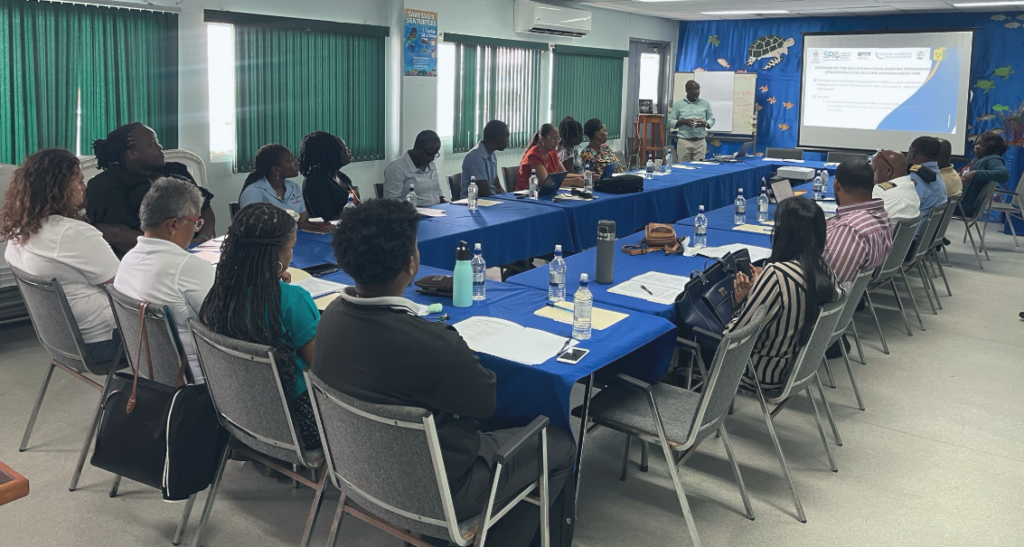
Meet the CSL Team
The CSL Project brings together a dynamic project team and seasoned experts dedicated to ensuring that the Caribbean’s voice is heard in international maritime climate negotiations.

Dr. Jan Yves Remy
Project Director
Oversees the strategic direction of the project.

Nafesha Richardson
CSL Research Fellow
Aligns technical, legal, economic analyses with objectives.

Tianna Blades
CSL Research Fellow
Coordinates team and consultants, manages stakeholders, ensures project adherence.

Jaeda Sutherland
CSL Delegation Coordinator
Key liaison between Caribbean delegates and the CSL team.
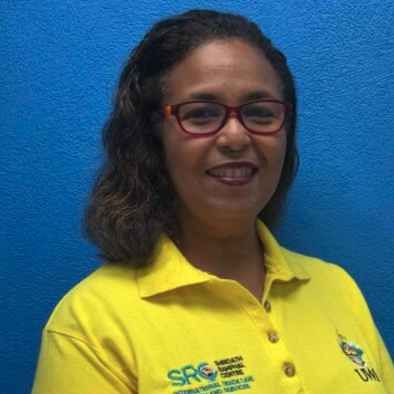
Desiree Evelyn
CSL Administrative Assistant
Manages key logistical and administrative aspects of the project.
CSL also coordinates and commissions expert work including impact assessments, economic modeling, legal analysis, and stakeholder consultations to better understand how the IMO’s decarbonization measures will affect the Caribbean. CSL collaborates with stakeholders to assess the impact of IMO GHG policies, model economic effects on key industries, explore food security threats, analyse Caribbean legal interests, engage regional stakeholders and advance decarbonization research and sustainable energy options, ensuring the region’s informed engagement in global maritime discussions.
Trade, Shipping and Climate Change - Facts and Figures
1%
Small Island Developing States (SIDS) account for less than 1% of global greenhouse gas emissions
2022
In 2022, CARICOM exported $43.7B (0.18% of global exports) and imported $47.1B (0.2% of global imports)
2.89%
The shipping industry is responsible for approximately 2.89% of GHG emissions, according to the IMO.
2050
The 2023 IMO Strategy on Reduction of GHG Emissions from Ships aims to peak GHG emissions from international shipping as soon as possible and to reach net-zero GHG emissions by or around, i.e. close to, 2050
Caribbean Shipping Lanes Webinars
The SRC is excited to offer a series of webinars designed to foster ongoing discussion and provide updates on the latest developments in IMO GHG negotiations. These webinars will bring together experts from the global maritime industry, climate policy, and Caribbean governance to discuss key issues such as the economic impacts of GHG regulations on small island states, strategies for compliance with international standards, and opportunities for collaboration.
![SRC CBBEAN SHIPPING LANES - IMO LTC FINAL5[69]](https://shridathramphalcentre.com/wp-content/uploads/2024/09/SRC-CBBEAN-SHIPPING-LANES-IMO-LTC-FINAL569-300x300.jpeg)
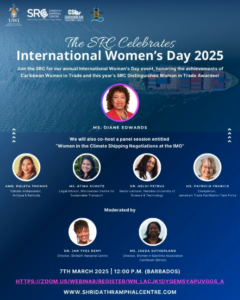
Caribbean Shipping Lanes Blogs
The Caribbean Shipping Lanes blog is a regular publication which explores shipping, trade, and climate change in the Caribbean. Through our own contributions and those of guest authors, we offer crucial insights into the latest developments in maritime regulations, regional trade trends, and strategies to address climate challenges affecting the Caribbean's essential shipping routes.
- Put a Price on Shipping Emissions – 19th September 2024 Project Syndications Article by Shania Scotland
- The IMO’s Revised GHG Strategy – What is Happening and Why Should Caribbean States Care? – 25th September 2024 Trading Thoughts by Nafesha Richardson
- CSL Stakeholder Consultations on the IMO GHG Emissions Reduction Strategy – 25th February 2025 Trading Thoughts by Rosemarie Cadogan and Tianna Blades
The views and opinions expressed are solely those of the individual authors and are presented for academic interest and discussion. They do not reflect the official policies or positions of the Shridath Ramphal Centre (SRC) or partners of Caribbean Shipping Lanes.
SRC IMO-Related Training and Workshops

Regional Workshop on the 2023 IMO GHG Strategy in Belize
Over the past year, the Belize Port Authority, supported by international and regional partners, has led the Caribbean in crucial shipping decarbonisation negotiations at the IMO. In March 2024, Caribbean delegations met with representatives from the Kingdom of the Netherlands to address the impact of mid-term measures on small island developing states (SIDS). This collaboration resulted in a workshop held in Belize City from July 10–11, 2024, gathering 85 participants from 18 member states and territories. The workshop focused on implementing and reviewing short-term measures, developing mid-term strategies, and addressing the unique challenges faced by Caribbean maritime sectors. The workshop underscored the critical role of Caribbean institutions and the importance of ongoing regional collaboration to achieve sustainable maritime decarbonisation.
More information about the workshop is available here.
Strategic Training on IMO Climate Change-Related Negotiations for CARICOM Maritime Officials
Shipping is vital to the Caribbean region's economic stability and development, making it imperative for Caribbean Community (CARICOM) member states to play a crucial role in IMO GHG reduction negotiations to ensure sustainable and equitable growth. Through the collaborative efforts of the SRC, the University College London (UCL) Energy Institute, the United Nations (UN) Foundation and the Belize Port Authority (BPA), a virtual strategic training session for maritime officials from the Caribbean Community (CARICOM) engaged in climate-related negotiations at the IMO was convened from the 22-26 July 2024. This training provided participants with a comprehensive understanding of the IMO and its role in addressing climate change, particularly in the context of the shipping industry.
More information about the training is available here.
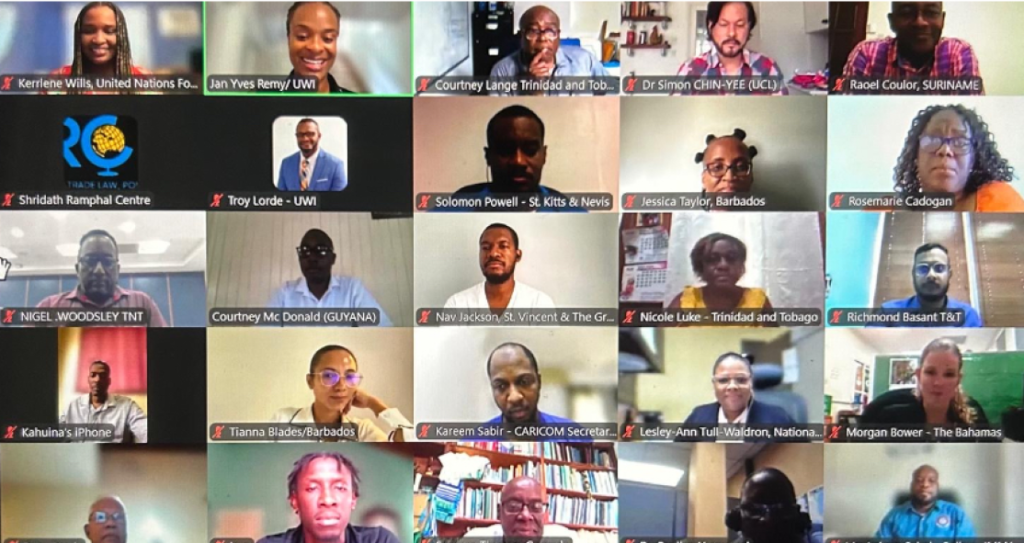
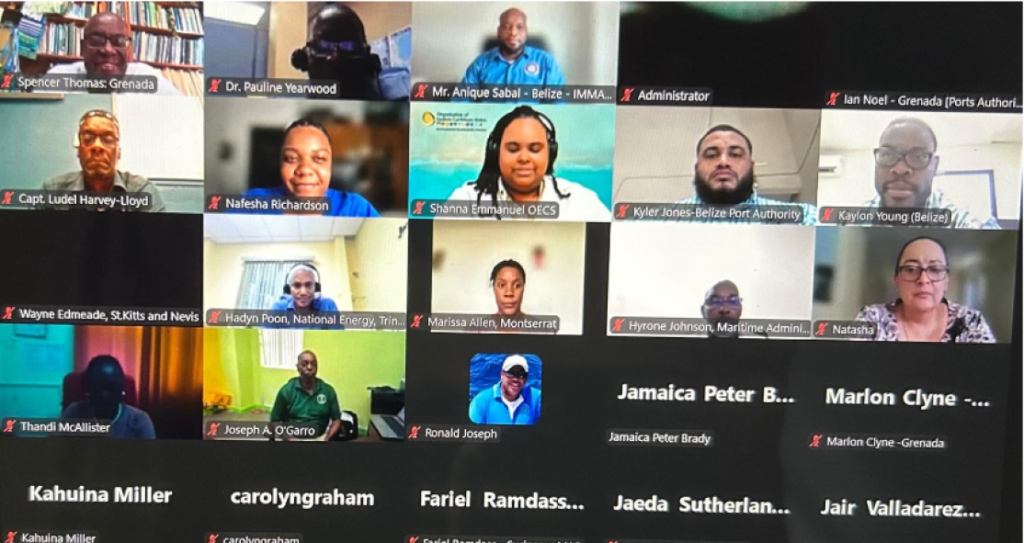
CSL Stakeholder Engagement Workshops
In January 2025, CSL conducted a series of stakeholder consultation workshops across four Caribbean nations to discuss the IMO’s proposed measures for reducing greenhouse gas emissions in the shipping industry. These workshops aimed to assess the potential impacts of the IMO's GHG reduction strategy on SIDS and to formulate unified regional positions for upcoming international negotiations. Led by CSL Stakeholder Engagement Consultant Rosemarie Cadogan and supported by members of the CSL project team, these sessions brought together key maritime and policy stakeholders.
St. Vincent and the Grenadines – January 21, 2025
The inaugural workshop in Kingstown gathered maritime stakeholders to evaluate the effects of the IMO's proposed measures, particularly focusing on the implications of a carbon levy and the necessity for more sustainable ferry services. The session saw pivotal contributions from Hyrone Johnson, Director of the SVG Maritime Administration, and Nafesha Richardson, SRC-IMO Research Fellow.
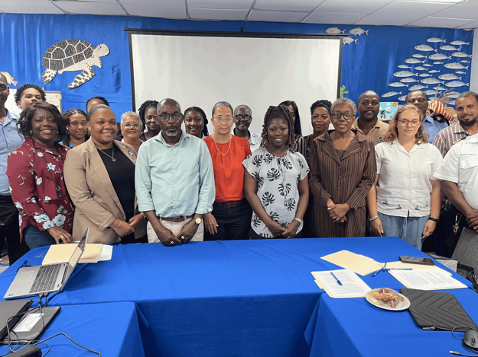
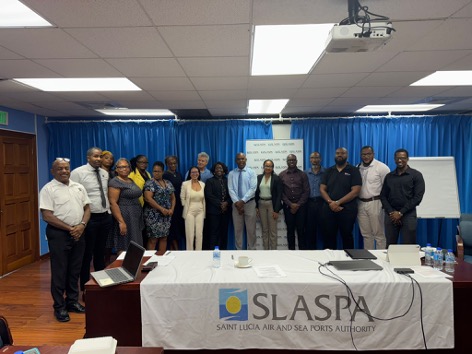
St. Lucia – January 23, 2025
Held in Castries, this workshop brought together participants from both public and private sectors to explore the challenges and opportunities presented by the IMO's 2023 GHG Strategy. Discussions centered on the potential impact of the proposed measures on St. Lucia's maritime industry. The session was led by Christopher Alexander, Director of Maritime Affairs at SLASPA, and SRC-IMO Research Fellow Tianna Blades.

Jamaica – January 26, 2025
In Kingston, stakeholders engaged in comprehensive discussions on how the IMO's proposed measures intersect with climate change, maritime policy, and sustainable development across Jamaica's diverse industries. The workshop was supported by Bertrand Smith, Director of the Maritime Authority of Jamaica, and Kerrlene Wills of the United Nations Foundation.
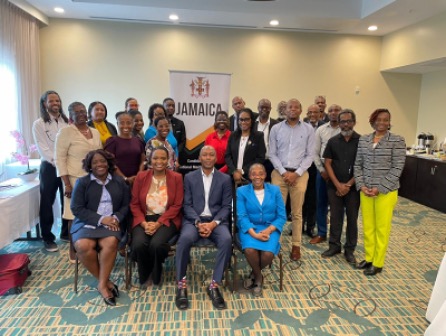
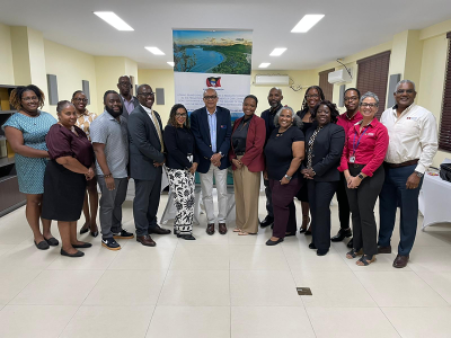
Antigua and Barbuda – January 30, 2025
The final consultation in St. John's aimed to refine national perspectives on the IMO's proposed measures, ensuring that considerations specific to SIDS remain central in international negotiations. Key contributions were made by Ambassador Dwight Gardiner, Darion Lake, and Darwin Telemaque, CEO of the Antigua and Barbuda Port Authority, with support from Kerrlene Wills of the United Nations Foundation.

These workshops are pivotal in shaping the Caribbean's stance for upcoming IMO meetings, advocating for a fair and equitable transition for SIDS in the global effort to reduce GHG emissions from shipping.
Important IMO-Related Documents, Submissions and Publications
Caribbean-Related Submissions
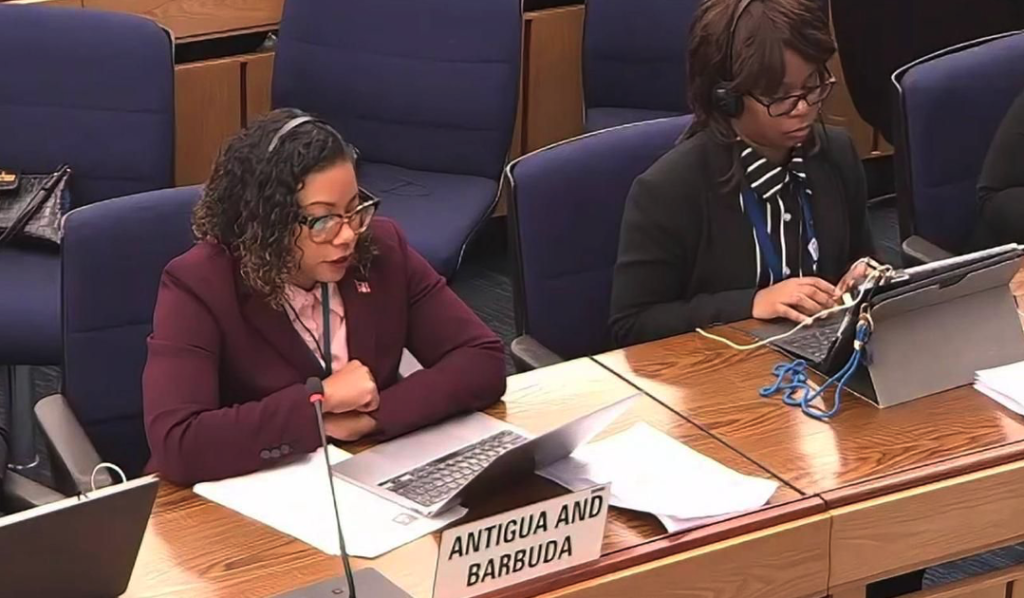
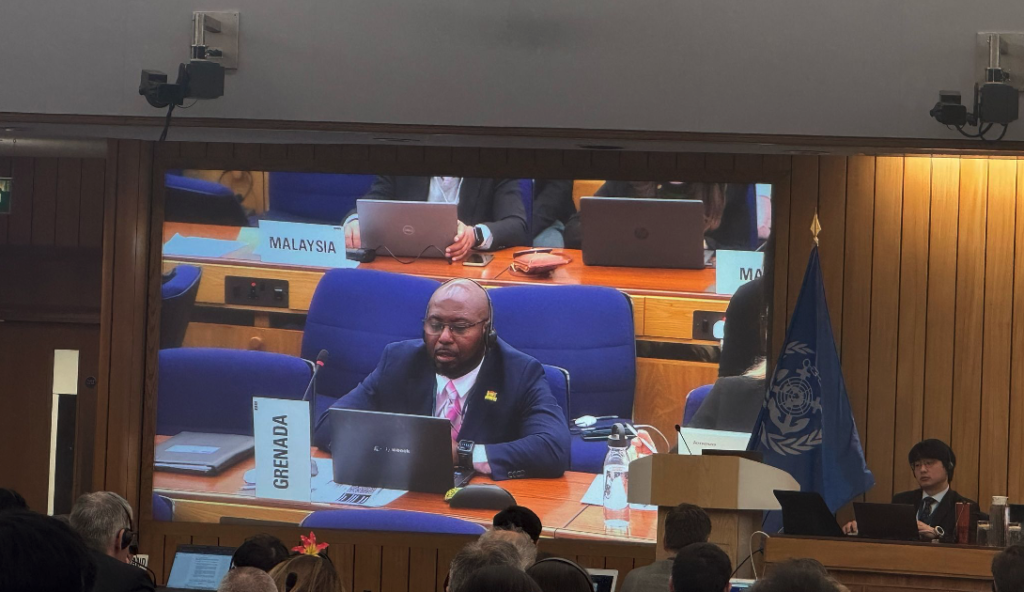
ISWG Submissions
Date
Reference
Submission Title
Submitted by
25 January 2024
ISWG-GHG 16/2/3
FURTHER CONSIDERATION OF THE DEVELOPMENT OF CANDIDATE MID-TERM MEASURE(S) IN THE CONTEXT OF PHASE III OF THE WORK PLAN FOR THE DEVELOPMENT OF MID- AND LONG-TERM MEASURES
Bahamas, Liberia and ICS
26 January 2024
ISWG-GHG 16/2/6
FURTHER CONSIDERATION OF THE DEVELOPMENT OF CANDIDATE MID-TERM MEASURE(S) IN THE CONTEXT OF PHASE III OF THE WORK PLAN FOR THE DEVELOPMENT OF MID- AND LONG-TERM MEASURES
Belize, Fiji, Kiribati, Marshall Islands, Nauru, Solomon Islands, Tonga, Tuvalu and Vanuatu
9 August 2024
ISWG 17/2/18
FURTHER CONSIDERATION OF THE DEVELOPMENT OF CANDIDATE MID-TERM MEASURE(S)
Position Paper on the mid-term measures and impacts on the Caribbean Region
Antigua and Barbuda, Belize, Dominica, Grenada, Jamaica and Saint Lucia
20 December 2024
ISWG-GHG 18/2/5
FURTHER CONSIDERATION OF THE DEVELOPMENT OF THE BASKET OF CANDIDATE MID-TERM GHG REDUCTION MEASURE(S) USING ANNEX 1 TO DOCUMENT MEPC 82/WP.9 AS THE BASIS
Austria, Bahamas, Belize, Belgium, Bulgaria, Croatia, Cyprus, Czechia, Denmark, Estonia, Fiji, Finland, France, Georgia, Germany, Greece, Hungary, Ireland, Italy, Jamaica, Japan, Kenya, Latvia, Liberia, Lithuania, Luxembourg, Malta, Marshall Islands, Montenegro, Netherlands (Kingdom of the), Nigeria, Palau,Panama, Poland, Portugal, Republic of Korea, Romania, Seychelles, Slovakia, Slovenia, Solomon Islands, Spain, Sweden, Tonga, Tuvalu, Ukraine, United Kingdom, Vanuatu, European Commission and ICS
3 January 2025
ISWG-GHG 18/2/6
FURTHER CONSIDERATION OF THE DEVELOPMENT OF THE BASKET OF CANDIDATE MID-TERM GHG REDUCTION MEASURE(S), USING ANNEX 1 TO DOCUMENT MEPC 82/WP.9 AS THE BASIS
Belize, Fiji, Jamaica, Marshall Islands, Palau, Seychelles, Solomon Islands, Tonga, Tuvalu, Vanuatu and ICS
3 January 2025
ISWG-GHG 18/2/19
FURTHER CONSIDERATION OF THE DEVELOPMENT OF THE BASKET OF CANDIDATE MID-TERM GHG REDUCTION MEASURE(S), USING ANNEX 1 TO DOCUMENT MEPC 82/WP.9 AS THE BASIS
Antigua and Barbuda, Belize, Dominica, Ethiopia, Fiji, Jamaica, Kiribati, Marshall Islands, New Zealand, Palau, Samoa, Seychelles, Singapore, Solomon Islands, Tonga, Tuvalu and Vanuatu
3 January 2025
ISWG-GHG 18/2/20
FURTHER CONSIDERATION OF THE DEVELOPMENT OF THE BASKET OF CANDIDATE MID-TERM GHG REDUCTION MEASURE(S), USING ANNEX 1 TO DOCUMENT MEPC 82/WP.9 AS THE BASIS
Belize, Dominica, Fiji, Jamaica, Kiribati, Marshall Islands, Palau, Samoa, Seychelles, Solomon Islands, Tonga, Tuvalu and Vanuatu
MEPC Submissions
Date
Reference
Submission Title
Submitted by
24 July 2024
MEPC 82/INF.18
REDUCTION OF GHG EMISSIONS FROM SHIPS
Sustainable shipping and ports for SIDS: resilience and strengthened climate investment
Antigua and Barbuda, Belize and Suriname
26 July 2024
MEPC 82/INF.48
Antigua and Barbuda, Jamaica, Saint Kitts and Nevis, Saint Vincent and the Grenadines, and Trinidad and Tobago
Other Important Documents and Resources
- Comprehensive Impact Assessment of the Basket of Candidate Mid-term GHG Reduction Measures
- UCL Energy Institute, Getting to Zero Coalition, and UN Climate Change High Level Champions – Climate action in shipping: Progress towards shipping’s 2030 breakthrough (2024 ed.)
- The World Bank – Distributing Carbon Revenues from Shipping (2023)
- UCL UNCTAD CIA Plotting tool (2024)
- Cambridge University Press – Carbon Pricing for International Shipping and Border Carbon Adjustment Mechanisms: A Case for Regulatory Cooperation(2024)
- APRI – Navigating climate action: Assessing the economic impacts and trade-offs of a shipping carbon tax for African states (2024)
- The Maritime Executive – Caribbean States Join Together to Call for Fuel Levy (2024)
- The Legality of Revenue Disbursement from an Economic Measure Agreed at the International Maritime Organization for Purposes Other than the Decarbonisation of International Shipping
- Shipping SOS for CARICOM – Nation News
- Clock Ticking on Shipping Emissions Measures – Nation News
- Informal CSL Briefing Note – CARICOM’s participation in the IMO’s 18th Inter-Sessional Working Group on Green House Gas Emissions
- Chair’s Report from ISWG-GHG 18

